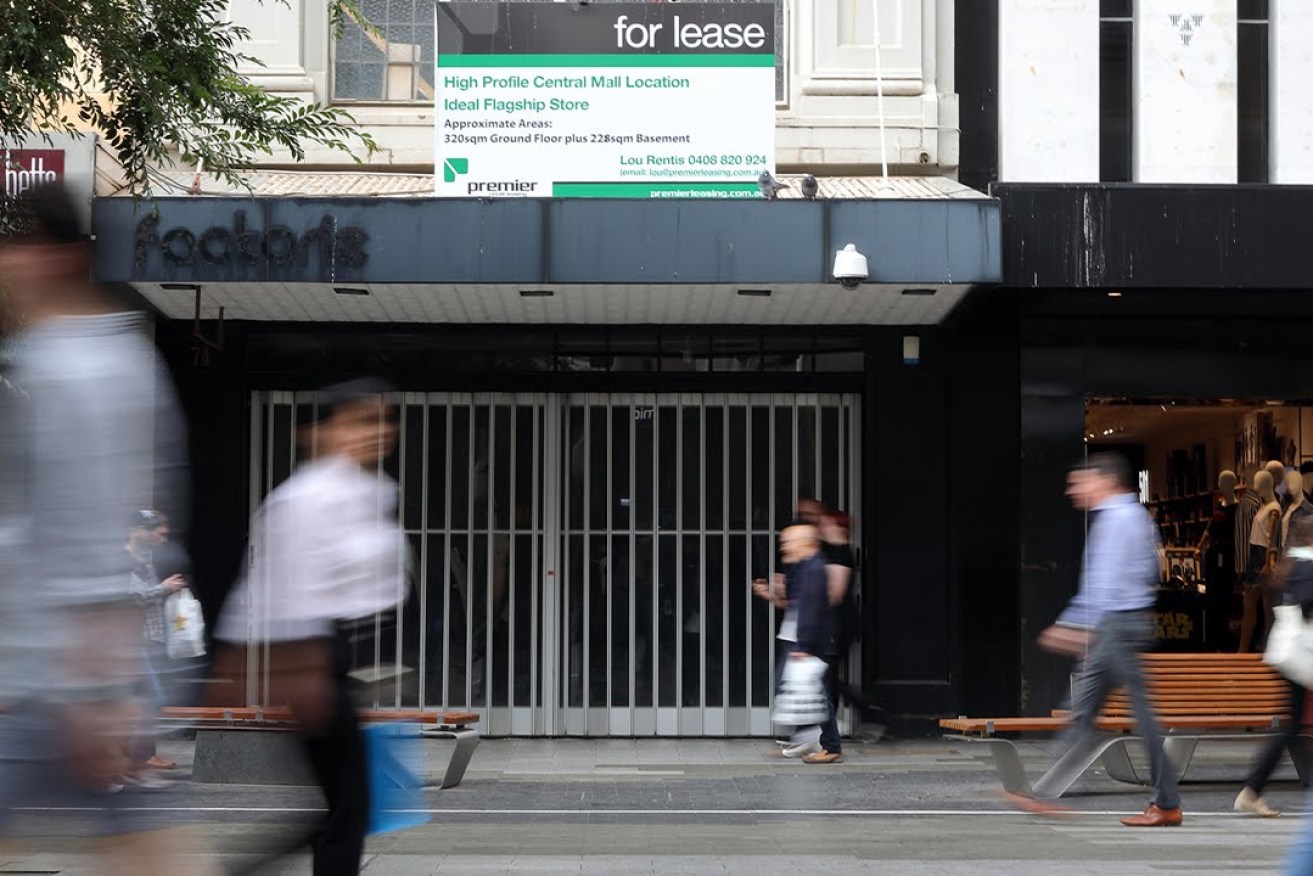Radical ideas put full employment back on the agenda
Our rates of unemployment and underemployment are a scandal caused by myopic economic policies, writes Greg Ogle. He argues for a return to the goal of full employment – and outlines how we might fund it.

A shuttered shop in Adelaide. "It is so long since full employment was part of the policy debate that it now seems hard to even consider it as realistic or achievable." Photo: Tony Lewis/InDaily
There has been discussion in Adelaide policy circles recently about Modern Monetary Theory (MMT) with lectures, conference presentations and workshops by visiting American academic, Professor Stephanie Kelton, who is also senior economic advisor to US Presidential hopeful Bernie Sanders.
MMT suggests that national governments that create and issue money do not have the same budget processes and constraints as businesses and households – precisely because they can issue money to buy what they need. Accordingly, these governments can and should use fiscal policy – budget deficits if need be – to achieve full employment, creating new money to fund new programs and utilise the unused resources in the economy. Anything less than that is a choice for the economy to operate at below capacity.
This may be particularly relevant as we confront the challenges of bushfire reconstruction, and it is easy to see why MMT would be of interest to those thinking about tackling climate change and transitioning to a safe but growing economy. MMT underpins the Green New Deal policies being championed by Sanders and others in the United States.
For the community service sector, a particularly important policy associated with MMT is the proposed job guarantee, with the government effectively acting as an employer of last resort hiring at the minimum wage. Of course, a job guarantee scheme could be done outside of MMT and there may be a devil in the detail.
Further, many people in poverty may prefer a universal income guarantee, but the job guarantee fits well with MMT where it provides a buffer both for those who would otherwise be unemployed and for the economy which would be buttressed by the maintenance of demand and job-ready labour provided by those workers.
The fact that this level of unemployment and underemployment is not seen as an ongoing national scandal is itself scandalous.
Obviously MMT and the job guarantee are much more complicated than the few lines above – and both are very contentious. Those schooled in orthodox economics rail against potential inflation and debt – concerns that Stephanie Kelton was keen to rebut.
But regardless of one’s position on MMT, what is undeniable and very valuable is that it puts the issue of full employment back on the public policy agenda.
https://www.youtube.com/watch?v=gcgDazSsyRw
Full employment was once a key goal of government policy in Australia until it fell victim to a decades-long fight to slay the inflation dragon. That fight is now long won, but the collateral damage from the policies of that era are still with us: 56,000 people unemployed in South Australia and, in addition, more than 85,000 underemployed and looking for more work (both figures are seasonally adjusted).
The fact that this level of unemployment and underemployment is not seen as an ongoing national scandal is itself scandalous. People’s lives and potential economic contribution are just being tossed away.
The cost to the community of this lost contribution is in the millions of dollars. The personal cost to unemployed workers is incalculable as they are driven towards isolation and poverty by hopelessly inadequate income supports and a system that treats them as criminals and pariahs.
It is so long since full employment was part of the policy debate that it now seems hard to even consider it as realistic or achievable.
Macroeconomic debates fixate on interest rates, budget outcomes and GDP, while unemployment policy largely focuses the level of income support payments and management regimes.
Demands to increase Newstart, change unfair payment restrictions and stop (often unreal) automated debt collection are vital for those struggling to survive without employment, but they do not address the long-term systemic plague of unemployment and underemployment.
Whatever the outcome of the economic theory debates around MMT, for those who are locked out of employment by a lack of jobs, or struggling to make ends meet with too little work, a return to a macroeconomic goal of full employment is long overdue.
Dr Greg Ogle is the senior policy and research analyst the South Australian Council of Social Service (SACOSS).
Want to comment?
Send us an email, making it clear which story you’re commenting on and including your full name (required for publication) and phone number (only for verification purposes). Please put “Reader views” in the subject.
We’ll publish the best comments in a regular “Reader Views” post. Your comments can be brief, or we can accept up to 350 words, or thereabouts.




